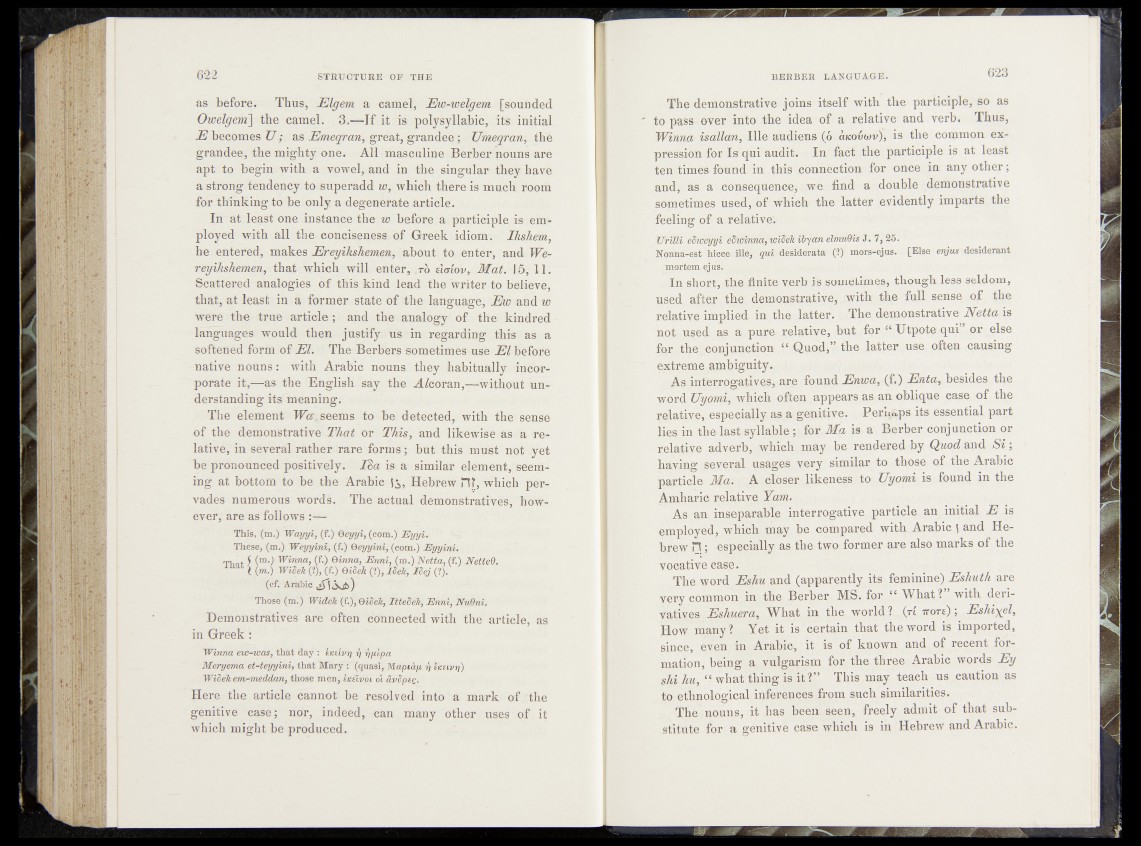
as before. Thus, Elgern a camel, Ew-welgem [sounded
Owelgem] the camel. Sit—If it is .polysyllabic,.„its initial
E becomes U; Emeqran, great, grandee;; Umeqran, the
grandee, the mighty one. .r'All masculine Berber pouns are
apt to begin with a vowel, and in the singular they have
a strong tendency to. superadd w, which there is much room
for thinking to be only a degenerate article.
In at least one instance the w before a participleasr employed
with all the conciseness of Greek idiom. Ikshem,
he entered, makes Ereyikshemen, about to enter, and We-
reyikshemen, that which will enter, .to elalov, Mat. 15, 11.
Scattered analogies of this kind lead the writer to believe,
that, at least in a former state of the language, Eioa.nd w
were the true article; and the analogy of the kindred
languages would then justify us in regarding this as a
softened form of El. The Berbhrs'sometimes-nse El^6fore
native nouns: with Arabic nouns theyfhabitually «incorporate
it,—as the English say the J./coran,—without understanding
its meaning.
The element IFer^seems to be. detected, with vthfe'sense
of the demonstrative That or This, and likewise as aire-.
lative^in »evesral-rathetrare forms; but this mustinot yet
be pronounced positively. ' Ida is a similar element,f.seem-
ing at bottoffi to be the Arabic Hebrew Ht, which pervades
numerous words. The actual demonstratives, however,
are as follows :—jj
This, (m.) Wayyi, (f.) Qeyyi, (com.) E y y i.;r?
These, (m.) Weyyini, (f.) Qeyyini, (com.) Eyyini.
«That 5 (ra0 Winna, (f.) Qinna, Enni, (m.)fretta, (f.) fretted.
a \ Wide* (?), (L) didek (1), IdeJi, Id® (?).
(cf. Arabic £ \ <>jh)
Those (ml) Widek (f.j, QiSeh, Ittedek, Enni, frudni.
Demonstratives are often connected with the article, as
in Greek:
Winna ew-was, that day: tid v t] 17 rjjiepa
Meryema et-teyyini, that Mar^T (quasi, J&apt&p j) ikstvni^ k
WiSeTtemr-meddan, those men, hzeivoi ol avSpeQ.
Here the article cannot be resolved into a mark of the
genitive case; nor, indeed, can many other uses of it
which might be produced.
The demonstrative joins itself with the participle, so as
to pass, over into the idea of a relative and verb. Thus,
Winna'isalian, Ille audiens (6 okoixov), is the coxpmon expression
.for Is qui audit. In' fact jthe participle is at least
ten times found in this connection for once, in any other;
and, as a consequence, we find a double demonstrative
sometimes used, of. which the latter evidently imparts the
feeling of a relatives v
Urilli efiweyyv eSwinna, ‘w%tek ibyan elmudis J. 7,25. jj
Nonna-est hiccelffife^wi desiderata (?>)' moTs-ejus. [Else enjus desiderant
imortem ejus.. ■
In short, the finite verb i£ sometimes, though less seldom,
used after the demonstrative, with tbje full sense of; the
relative implied in the ,latter. The demonstrative Netta is
not used as a pure» relative, but,.for “ Utpotequi or else
for the;conjunct]on “ Quod,” the latter use often causing
extreme ambiguity, j
As interrogativ.es, are found Enwa, (f.) Enta, besides the
word Uyomi^f^ich. often appears as an oblique case, of the
relative, especially as a genitive. Perq&ps its essential part
lie^in the last syllable ;,j.for Ma is a Berber conjunction or
relative adverb, which ,|may • be rendered by Quod and S i ;
having „several usages very similar to those of the Arabic
particle Mg. A closer,likeness to Uyomi is found jg the
Amharic relative Yam.
As an inseparable interrogative particle an initial E is
employed, which may be compared with Arabic \ and Hebrew
n ; especially as the two-farmer are also marks of the
vocative case*
The word Eshu and (apparently^|t|^qminine) Eshutk are
very common in the Berber MS. for “ What,? with derivatives
Eshuera, What in the world? . (rt 7rore); Eshix^h
How many? Yet it is certain that the word is imported,
since, even in Arabic, it is of known and of recent formation,
being a vulgarism for the three , Arabic words Eg
hu, “ what thing isr.it?” This may teach us caution as
, to ethnologicah inferences from such similarities.
The nouns, it has been seen, freely admit of that substitute
for a genitive case which is in Hebrew and Arabic.